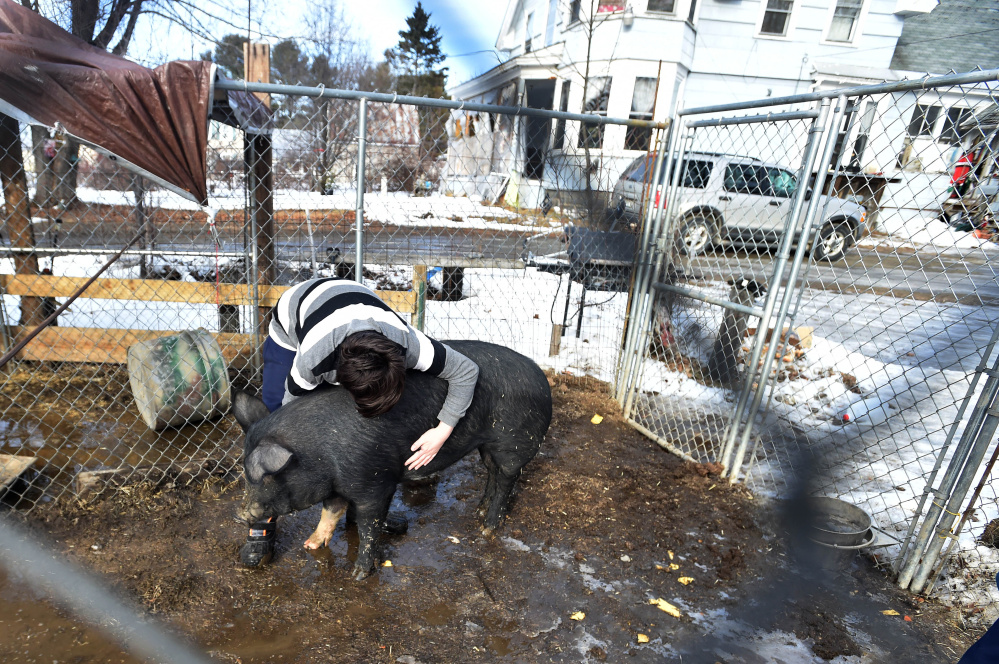MADISON — Residents Monday night debated whether the town should designate a downtown area subject to zoning and whether to approve changes to the property maintenance ordinance.
Both proposals were among five ordinances that the town is looking at amending or adopting and that will be voted on at Town Meeting in June.
The proposed changes to the property maintenance ordinance, adopted in 2012, also come on the heels of a $15,000 fine that the town charged one property owner for violations on Old Point Avenue in the downtown area.
“We don’t have the money to go to Hight Ford every day and buy a new vehicle,” said George Hand, whose girlfriend, April Carrigan, was recently issued the $15,000 fine after a year-long dispute with the town regarding maintenance of the property. Hand challenged the town’s claims that he had junk cars on the property that were in violation of the property maintenance ordinance and was one of a handful of residents who spoke on the property maintenance ordinance during Monday night’s public hearing.
Under the proposed changes to the ordinance, the town could seek a court order to clean up a property that is in violation of the ordinance and issue the bill to the property owner. Town officials Monday night said the change would help to lower fines for property maintenance violations, since property owners who fail to clean up their property would not be charged on a per diem basis as disputes drag on.
Both the changes to the property maintenance ordinance and the proposed designation of a village area, which would create zoning around downtown Madison, are proposals that selectmen said were drafted based on complaints they’ve received.
“These are the things I get calls on all the time,” said Chairman of the Board of Selectmen Al Veneziano. “No one calls about taxes. They call about the smell next door or the mess next door.”
The only zoning that Madison currently has is a shoreland zoning ordinance mandated by the state, and the proposed village area would lay groundwork for ordinances that would only apply to the downtown area, said Town Manager Tim Curtis.
Residents Monday night were divided over whether creating such a village area would be beneficial, and many criticized the notion of zoning. The village area does not have implications for regulation of fireworks or farm animals downtown, but those are two areas around which future ordinances could be developed, Curtis said.
“The fact that certain rules can be different based on where you live may be difficult for people to understand, but I think people have to realize that having farm animals on your property when you live downtown can adversely affect your neighbor,” Curtis said.
Selectman Paul Fortin also mentioned that both a lack of property maintenance and looser regulations in the downtown area can affect home values.
“There are a lot of homes for sale. By us not having some of these things in place, it is affecting all taxpayers because of their inability to sell,” Fortin said. “These are simple things that will help people protect the value of their homes and the ability to sell them.”
Resident Peter Sirois said he is not bothered by farm animals in the downtown area.
“This is a rural area and that’s part of our way of life. I don’t want it to go away,” he said.
Randy Wodworth, who lives outside of downtown Madison near the Lakewood Theater, said he is opposed to a designation that applies only to a part of town. Although he does not live downtown, Wodworth said he still lives in a concentrated area where there have been problems with fireworks being set off and that if a fireworks ordinance were to be developed, it should apply to the town as a whole.
“If you single out one area, people will be moving out of downtown to the parking lot of the theater to set off their fireworks,” Wodworth said. “I don’t believe you should exclude half the town because we don’t live on Main Street.”
Also discussed Monday night were proposed changes to the town’s cemetery and building permit ordinances and the proposed establishment of a minimum lot size, though those proposals generated fewer comments.
“When it comes to farm animals, someone might say they want farm animals and another person might say they don’t,” said resident Michael Whalen. “It’s two different wills. It’s important though that we sit and talk about it.”
Rachel Ohm — 612-2368
Twitter: @rachel_ohm
Copy the Story LinkSend questions/comments to the editors.




Success. Please wait for the page to reload. If the page does not reload within 5 seconds, please refresh the page.
Enter your email and password to access comments.
Hi, to comment on stories you must . This profile is in addition to your subscription and website login.
Already have a commenting profile? .
Invalid username/password.
Please check your email to confirm and complete your registration.
Only subscribers are eligible to post comments. Please subscribe or login first for digital access. Here’s why.
Use the form below to reset your password. When you've submitted your account email, we will send an email with a reset code.